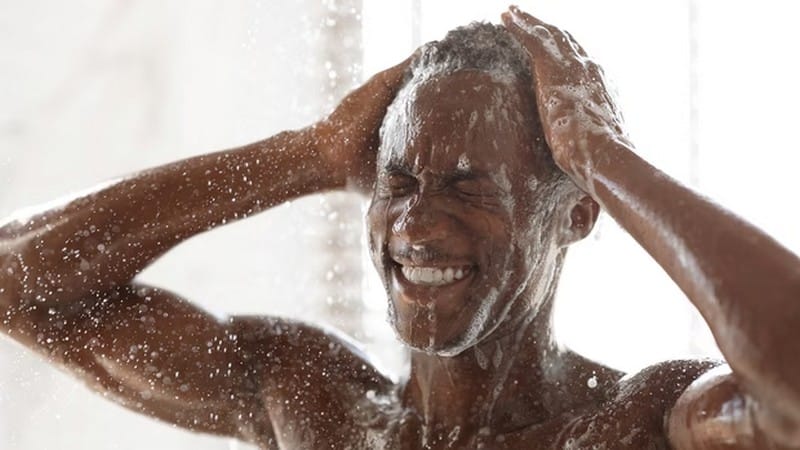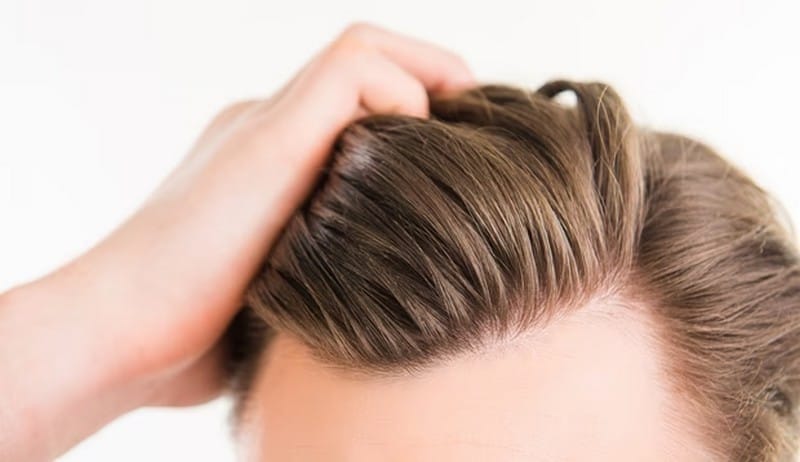Does your scalp itch and burn constantly, and nothing helps? We’ll help you find out what’s causing it and what can help
How it itches! Driving you crazy. Small consolation: You are not alone with an itchy scalp; almost 75 percent of the world’s population suffers from it. But help is coming! Our experts reveal the causes behind the itching and give tips on what you can do if you have scalp problems. Whether organic care products, anti-dandruff shampoos from the drugstore, or simple home remedies, there is guaranteed to be something for every scalp type.
Why does the scalp itch?
If the scalp itches or burns, then the “skin barrier,” i.e., the skin’s natural protective layer, is disturbed. The reasons for this can include genetics, stress, or poor nutrition. But dry, heated air in the winter or excessive UV radiation in summer can also lead to itching because both dry out the scalp.
“Itching usually doesn’t come alone. Accompanying symptoms often include redness, dandruff, papules, pustules, and blisters,” emphasizes Hamburg dermatologist Dr. Susanne Steinkraus. All of these changes can be an indication of inflammation, thus the cause of the itchy scalp.
Here’s one of the five most common causes of itchy scalps:
1: Incorrect hair care is often the problem
A lot helps a lot? Not in this case! “Too many care products and too frequent hot washing and blow-drying can throw the scalp out of balance in the long term. Shampoos with aggressive surfactants are particularly dangerous, as they form foam and dissolve grease and dirt from the hair,” emphasizes dermatologist Steinkraus.
However, special shampoos for sensitive scalps that use fewer surfactants are more suitable. Dandruff shampoos fall into this category and can also be used by people without dandruff but with sensitive scalps.
We recommend the Scalp Relief Dandruff Control Shampoo from Redken and, as a slightly cheaper alternative, the classic from Head & Shoulders. Chemical treatments, for example, coloring, can also cause itching on the scalp.

Danger! No matter how mild your shampoo is, when washing your hair, make sure the shampoo is rinsed out completely. Otherwise, itching can quickly occur.
2: Itchy scalp can be a sign of dandruff
If you find yourself scratching your head frequently, you may have dandruff. The body reacts to irritation with dandruff and itching. Dandruff can have both banal and medically relevant causes, such as allergic reactions. If you have sebaceous skin and yellowish dandruff, you should see a doctor.
“Such dandruff often occurs as part of seborrheic dermatitis, an inflammatory skin disease,” explains Dr. Steinkraus. Your doctor can prescribe special medications. Unfortunately, an anti-dandruff shampoo from the drugstore is usually not enough. What can help are these tips against dandruff.
3: Dry scalp itches
If other parts of your body also tend to be dry, a dry scalp is probably the cause of the itching. Any hair type can be affected, whether you have thick, thin, straight, or curly hair, or whether you have dandruff or not.
The same applies here: it is best to use a shampoo specifically for sensitive, dry scalps; always rinse thoroughly; and do not blow-dry your hair too hot.
We tested Eucerin’s DermoCapillaire Scalp Soothing Urea Shampoo, and it helped us a lot. Is itching the only thing that annoys you? This way, you can get any hair problem under control.
4: Fungal or bacterial infections cause severe itching
A fungus on the scalp also causes itching. Here, the skin can also show red and scaly spots. In addition, the lymph nodes in the neck and neck area may be enlarged.
Attention: The itching can also come from lice. Parents of young children are particularly affected. The lice form small nits (eggs), which can be easily found when the scalp is closely inspected.
5: The wrong diet disrupts the balance of your scalp
It’s not just external influences such as heat or cold that can put strain on your scalp. What you eat every day also affects the balance of your scalp. Intolerances or a lack of minerals and amino acids can be reasons for an itchy scalp. It’s best to have your blood checked for any defects if the itching doesn’t go away despite an adjusted care routine.
What should I do about an itchy scalp?
“Itchy scalps can have harmless temporary causes, but they can also indicate serious illnesses,” emphasizes dermatologist Susanne Steinkraus. It is therefore essential to know what the problem is before treating your scalp.
It’s best to first try whether a mild dandruff shampoo (e.g., Urea Acute Shampoo from Sebamed) solves the problem. Most of the time, the problem resolves itself.
Not for you? Then please don’t bother with yourself for too long, but make sure to see a doctor as soon as possible. “Finding the cause should always be the priority,” advises our expert. Depending on the cause, different home remedies, cosmetics, or conventional medical treatments can be of great help:

Tip 1: Switch to milder care
Check whether your care products are irritating your scalp! Starting with shampoo, styling products, and headgear, leave out individual things and watch closely to see whether the itching subsides.
And: “It’s best not to wash your hair with shampoo every day and only with water now and then,” says Dippel. Here, you can find the best shampoos for men.
Tip 2: Make your tea tree oil spray
Tea tree oil is not only beneficial for blemishes but also for itchy scalps.
The reason is that the essential oil has an antiseptic, i.e., anti-inflammatory, effect because it kills bacteria and fungi. To make a homemade anti-itch tea tree oil spray, take an empty spray bottle and fill it with 95 ml of water. Then add 5 ml of tea tree oil (e.g., tea tree oil from Natura Pur). Shake vigorously. If you have a sensitive, dry scalp, you should start with a lower dose of tea tree oil: 2 ml is enough.
Tip 3: A brush with boar bristles improves blood circulation
If you have to deal with itching on your scalp from time to time, you can prevent it—in times when there is no itching—with a brush made of boar bristles (e.g., from Brustenhaus Redecker). This is intended to stimulate blood circulation. Sebum production is regulated. Dryness and hair that is too oily should improve.
Tip 4: Home remedies such as baking soda help with dandruff
If you don’t want to buy a new shampoo right away, you can also try baking soda, apple cider vinegar, lemon juice or coconut oil. We can particularly recommend the cold-pressed coconut oil from Monte Nativo. According to numerous reviews in hair care forums, natural products help with at least occasional and mild dandruff.
However, there are no scientific studies on its effectiveness. And you won’t be able to get a severe dandruff problem under control.
Tip 5: You can change a lot with the right diet
“Depending on the cause, a change in diet can be very helpful,” says Dippel. “A healthy diet can make up for a lot, especially in the case of hyperacidity and high levels of stress. In such cases, important minerals and amino acids, which are necessary as building materials for a healthy scalp, are usually missing.”
The expert therefore recommends consuming healthy fats such as omega-3 and omega-6 fatty acids. These are found, for example, in linseed or… Contains hemp oil.
But: “Before you start with a (complex) change in diet, you should first leave out the usual care products or replace them with others. The scalp usually reacts allergically and is irritated by certain ingredients,” says Dippel.

What should I not do if I have an itchy scalp?
Easier said than done, but don’t give in to the itch! “If in doubt, scratching will only make it worse, as bacteria can enter through minor injuries,” says dermatologist Dr. Steinkraus.
Frequent hair washing should also be avoided. And after washing, you should never blow-dry your hair too hot. Better just lukewarm. Too much styling can also irritate the scalp. That’s why it makes sense to avoid styling products altogether for a longer period of time.
Scalp problems usually only disappear with regular and, above all, appropriate treatment. Pay attention not only to external factors but also to your diet.
Basically: Give your scalp some time to regulate itself and definitely see a doctor if the itching doesn’t go away despite our tips.

Leave a Reply